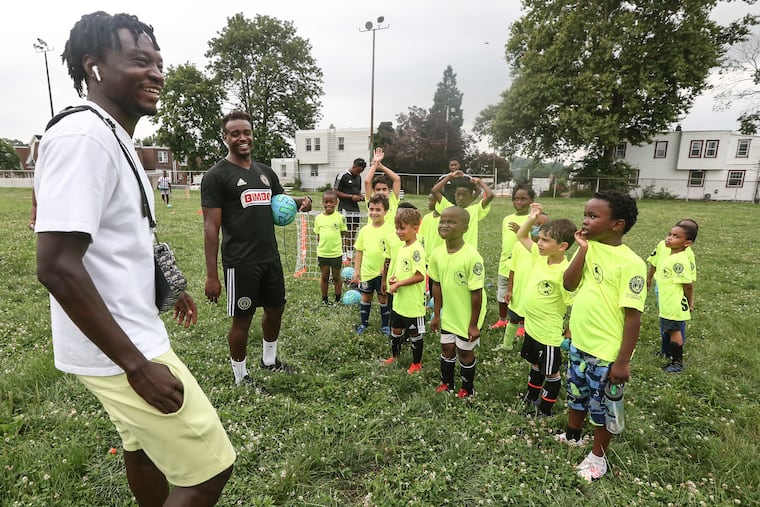The Swag brings soccer to inner-city kids through free clinics — and provides opportunities outside football and basketball
The group helps to make soccer a legitimate option, not just as a professional, but in everyday life.

Philadelphia Union defender Olivier Mbaizo stood in front of a group of kids, most of them ages 4-8, at Conservatory Field in Upper Darby after a two-hour soccer clinic. The children were asked by Swag director of coaching Nick Bibbs to name the person in front of them.
A bunch of children confidently raised their hand, but none could name Mbaizo. Well, one was technically right, saying Mbaizo was a “person.”
Bibbs, who played on the Union reserve team and professionally in Sweden, informed the kids of Mbaizo’s identity before the Union defender talked and took pictures with the group.
It’s a moment many of them will remember, and it could play a role in their soccer future. On a larger scale, The Swag is partnering with the Philadelphia Union Foundation to provide exposure in a sport that often is not the first option for inner-city kids. And they’re providing it through free soccer clinics.
“The whole idea is to develop these guys through the game,” Ryan Griffith, the Swag’s assistant director of coaching, said. “Obviously you want to find that diamond in the rough, but you want to develop these kids overall as human beings.”
Multiple sports history studies have indicated that Black people mostly run track or play football or basketball. A study noted by Eric Kilomowicz at Gettysburg College determined that around 70% of NBA (2017-18) and NFL players (2016-17) were African American in recent seasons.
While the reasons vary, two of the most notable are opportunity and exposure.
Opportunity often comes with what is affordable. Philly’s basketball culture is deep. Many parents either played or know someone who did, and that leads to exposure. Kids know what they see, and much of Philly’s youth know football or basketball.
Bibbs was that kid once. Growing up in West Philly, he played basketball but eventually learned to love soccer. He didn’t meet many Black people who shared that passion.
Bibbs even recalls being embarrassed at times when traveling to soccer practices and games. Sometimes when asked where he was going, he’d say a basketball game because it sounded cooler than soccer.
“I wasn’t the most athletic kid from my neighborhood, but athletically I went the furthest,” Bibbs said. “And that’s the whole thing. We’re tapping into these areas where kids haven’t been exposed.”
Meeting an MLS player and learning the fundamentals of soccer can create new opportunities — for kids and their parents.
At Conservatory Field, parents watched from chairs and bleacher seats as their children ran around in lime green shirts provided by the Swag.
Arnold Kennedy, 37, came to America at 17. He played professionally in the Liberian association, Jamaica, Sweden, and recently for the Philadelphia Lone Star. He stood alongside the field in a Liberian national team jersey, watching his son practice.
Kennedy has seen the impact of soccer exposure first-hand. Soccer is the top sport in Liberia, and most kids play competitively, so it was a stark difference when he came to America.
“Coming over here [to America], it was like dead,” Kennedy said. “The passion of the game, it was just sickening. Mentally if you weren’t strong, you didn’t want to play soccer in the U.S. back then. It was no chances given to have a fair chance of playing on the next level.”
Parents Byron Young and Dezaré Lyles were also on hand to watch their son, Blake. They like football and basketball, but they wanted to expose Blake to as many sports as possible.
He has done introductory T-ball courses, basketball, swimming, karate, and more. His parents believe soccer is his favorite since he has stuck with it.
“We try to give him all the exposure we can,” Young said. “We don’t want to force him to the common basketball or football.”
“In years past, he was the only Black boy for soccer and swimming,” Lyles said.
» READ MORE: Carli Lloyd has ‘never been this happy’ as she aims for her fifth major title with the U.S. women’s soccer team
Bibbs and other members of the Swag staff host clinics throughout the city. They reach more than 2,000 inner-city kids per year by purposely hosting clinics in Philly neighborhoods where football and basketball are popular.
It’s often been assumed that American soccer gets what is left over of players who drift away from track, football, and basketball. Think about the 12th man on an NBA roster who is supremely athletic but lacks natural basketball skills. What could he accomplish in another sport?
“They’d be dominant [in soccer],” Bibbs said.
Programs like the Swag are hoping to make soccer a more legitimate option, not just for professional reasons, but in life.
“You’re talking about full rides to college, maybe a few professional contracts, and maybe the opportunity to see the world,” Bibbs said. “I traveled all across the world and played in these different countries only because of soccer.”
You never know. The next great American soccer player could be on these fields.
“I guarantee you, like five years down the road, you’re going to see a really good player come out of this program,” Bibbs said.
The Philadelphia Inquirer is one of more than 20 news organizations producing Broke in Philly, a collaborative reporting project on solutions to poverty and the city’s push toward economic justice. See all of our reporting at brokeinphilly.org.